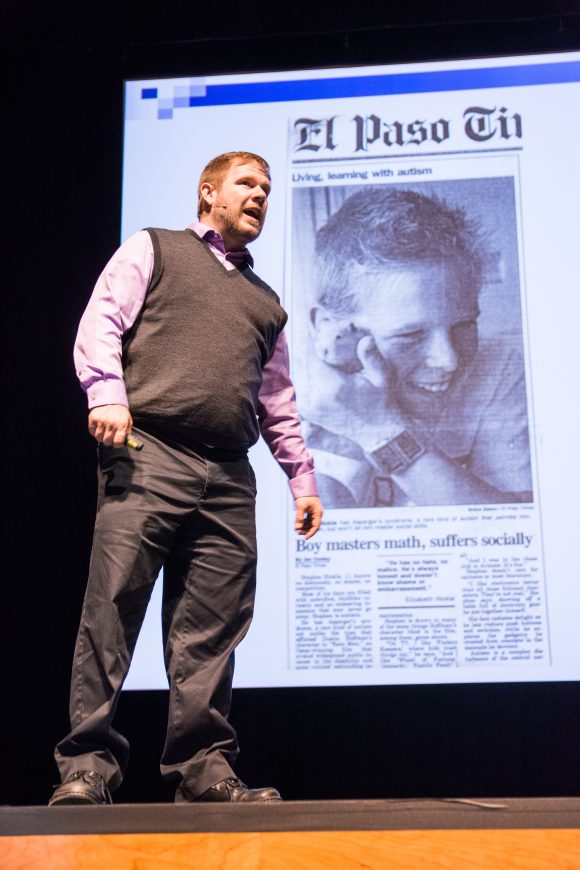Pushing societal limits Stephen Hinkle addresses educational inclusion at the DisAbility Summit
June 13, 2017
Just prior to Chapman University’s commencement ceremony, the Thompson Policy Institute of Disability and Autism hosted the 2nd annual DisAbility Summit at the Musco Center for the Arts. The exciting event featured the Thompson Policy Institute (TPI)’s cutting-edge research on critical issues in the area of disability and autism. Keynote speaker Stephen Hinkle addressed the community by sharing his personal experience of growing up with autism.

Some of Stephen’s experiences mirror what are often referred to as “splinter skills,” though this term often perpetuates tired stereotypes. Stephen shared that at the young age of four years old he learned how to program a computer, however making and sustaining friendships was a struggle. Stephen’s mom recalls Stephen banging his head against the floor, yet Stephen did not know he was different than other children his age.
Stephen was evaluated as a child and diagnosed with autism (Asperger Syndrome). Doctors shared that Stephen had no future and his mother was neurotic for believing otherwise. Ultimately, his parents were told that Stephen should be institutionalized.
Needless to say, Stephen was never institutionalized. The doctor’s comments served as the beginning of an uphill battle to advocate for appropriate support and resources. This battle was primarily felt in the public education system where Stephen’s parents championed for educational inclusion throughout his childhood and adolescence.
“People with autism and disability can succeed and we should never put limits on people when they’re young,” Stephen said.
Stephen’s time in segregated special education classes came to a halt after fourth grade. He transitioned into mainstream education where he had more exposure to friendships, social activities, and academic advancement.
In high school, Stephen took advanced placement (AP) computer sciences and AP physics. He also continued to establish friendships, learned how to dance, and attended senior activities including “Grad Nite” and prom.
Stephen graduated from high school in 1997 with a standard diploma which disproved the doctor’s thoughts on Stephen’s “limited future.”
But Stephen didn’t stop there. He attended college and obtained a bachelor’s degree in computer science from San Diego State University in 2007. Stephen then decided to transition into a different career path. He earned a master’s degree in special education with an emphasis in disability policy from Northern Arizona University in 2011.
“I crossed many things off a ‘bucket list’ of ‘things I would never do,’” Stephen said.
Today, Stephen is an international speaker where he discusses the fields of autism, inclusive education and disability policy. He has been speaking for over 16 years and uniquely shares his experience as a person with autism, a former special education student, and a professional with a master’s degree in disability policy.
Stephen’s accomplishments are largely tied to his parents’ advocacy for educational inclusion and his own determination to receive full access to the education he deserved.
When thinking back to the initial doctor’s diagnosis, Stephen proudly declares, “Boy, were those psychiatrists wrong. If I still had that [initial] doctor’s name, I would have sent him my graduation announcement.”
